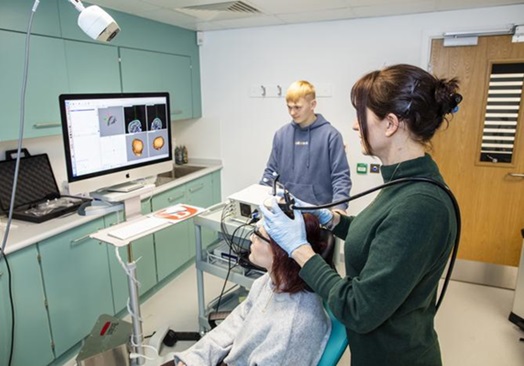Ultrasound Can Identify Sources of Brain-Related Issues and Disorders Before Treatment
Posted on 30 Oct 2024
For many years, healthcare professionals worldwide have relied on ultrasound to monitor the growth of unborn infants and evaluate the health of internal organs. However, ultrasound technology, once primarily used for imaging, is rapidly evolving into a targeted therapy that could significantly affect brain health, as highlighted in a recent article.
In the article published in the journal PLOS Biology, a group of researchers, including those from the University of Plymouth (Devon, UK), propose a non-invasive method to target specific regions of the human brain. This approach allows them to explore how transcranial ultrasound stimulation (TUS) may aid individuals suffering from various conditions, such as pain, alcoholism, obsessive-compulsive disorder (OCD), and Parkinson’s disease, all without the need for drugs or surgical interventions. Furthermore, the article discusses how this technology can be utilized to temporarily assess brain areas prior to treatment, acting as a “search and rescue tool for the brain.” This capability enables the identification of the underlying causes of brain-related disorders before treatment, potentially leading to more personalized medical approaches.

Nevertheless, the researchers recognize that several complex challenges must be addressed before TUS can be widely implemented in healthcare environments, and potentially even in homes, on a global scale. One significant hurdle is the fact that each of the 8.2 billion brains and skulls around the world is unique, creating the need for further refinement of the technique to ensure it is effective for a broad range of individuals. Although considerable progress has been made in advancing this technology, achieving a level of effectiveness that is also cost-efficient may still take several years. Currently, the researchers have developed and are testing a TUS device that is compact and user-friendly, allowing individuals to use it at home following initial clinical evaluations, rather than requiring frequent visits to hospitals or healthcare facilities. The researchers also explore how focused ultrasound could be combined with other emerging technologies to enhance the precision and efficacy of interfaces that facilitate direct communication between the brain and external devices.
“Over many years, we have improved our understanding of how the brain works and the failings within it that lead to neurological and mental health conditions. However, while advances have been made in treatments, they have not happened at a similar pace,” said Professor Elsa Fouragnan, who leads the Brain Stimulation Lab in the University of Plymouth’s Brain Research and Imaging Centre. “We believe TUS can fill that gap and through our research to this point, we have discovered how it can be a genuine search and rescue tool for the brain. Clinicians and patients are excited about its potential, and if the current pace of development continues, we could have a risk-free technology that can positively impact millions, if not billions, of people.”














